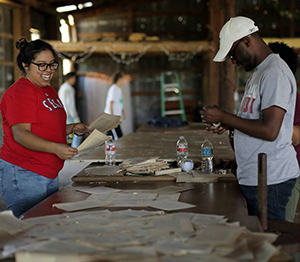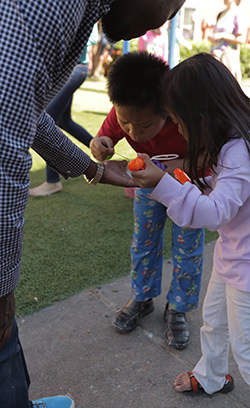Houston: Tackling brokenness, bringing wholeness
I have lived in Houston about three years now, and it has become home to me. I am in love with the myriad of cultures that live here. They stand out in the various neighborhoods pushed together in a way that creates unlikely neighbors out of people from all over the world. I am still enchanted when, even from the outside, I get to watch people celebrating in ways different from my own experiences.
Houston also is a significant place in my journey of knowing God. The Lord has used this place and the people here to teach me to grieve the losses I have accumulated throughout my life. I accepted Jesus and his righteousness into my life at a young age. I learned about discipleship and good works when I was in high school. In Houston, I have been learning about what it means for me to be known by God and to have been created in his image. I also have been learning about shalom—the wholeness or peace of God.
 Student missions volunteers bring peace and wholeness through their work at Kendleton Farms, the site of a future aftercare facility for survivors of sex trafficking.Shalom is ultimately God’s plan for the world and for individuals. He wants us, through Jesus, to be made whole in community with him and with each other. When I moved to Houston, I started praying into this vision for my life. However, I quickly realized the multitude of forces that work in opposition to shalom. Bringing justice to these dark places is the goal of Houston Week.
Student missions volunteers bring peace and wholeness through their work at Kendleton Farms, the site of a future aftercare facility for survivors of sex trafficking.Shalom is ultimately God’s plan for the world and for individuals. He wants us, through Jesus, to be made whole in community with him and with each other. When I moved to Houston, I started praying into this vision for my life. However, I quickly realized the multitude of forces that work in opposition to shalom. Bringing justice to these dark places is the goal of Houston Week.
I think that understanding the importance of shalom is crucial if we as workmen are to understand our role in Houston Week. Justice is a spiritual endeavor, but sometimes it can seem like the acts of service that make up the week are far removed from the spiritual world.
 Sometimes, bringing God’s peace and wholeness to a community begins with loving children and blowing bubbles with them.During Houston Week 2017, three areas of brokenness were tackled. To combat generational poverty, one team spent the week hosting various events in the Fifth Ward, including a block party for families and activities for kids all week. They also did service projects like building a ramp and painting a community center. Another team spent the week working to establish a presence in a refugee community. They played with kids all week and organized furniture in a warehouse. I worked with a team that spent the week at Kendleton Farms, a future aftercare facility for survivors of sex trafficking. I spent most of my time doing yard work, but others did a lot of painting, decorating, and cleaning.
Sometimes, bringing God’s peace and wholeness to a community begins with loving children and blowing bubbles with them.During Houston Week 2017, three areas of brokenness were tackled. To combat generational poverty, one team spent the week hosting various events in the Fifth Ward, including a block party for families and activities for kids all week. They also did service projects like building a ramp and painting a community center. Another team spent the week working to establish a presence in a refugee community. They played with kids all week and organized furniture in a warehouse. I worked with a team that spent the week at Kendleton Farms, a future aftercare facility for survivors of sex trafficking. I spent most of my time doing yard work, but others did a lot of painting, decorating, and cleaning.
I think sometimes we fall prey to the lie that doing ministry work has to look like praying with strangers and vocalizing the gospel. These endeavors are important, and I am not arguing against that. But serving the marginalized and the oppressed might look like preparing a place for them. It might look like never meeting them, but painting their future home. It might look like playing with their children or building them a ramp. Let me be clear: The idea these tasks are not spiritual in nature is fundamentally untrue.
As I worked at the farm during Houston Week, our leaders constantly implored us to pray over the land that we touched. We prayed for the women who might eventually live there, for their children, and for their futures. We declared in the name of Jesus that spirits of evil would not make a home there. The work of our hands was dedicated to the Lord.
In turn, I experienced God during Houston Week. During worship and prayer, he showed me some things about myself. To be honest, most of what he made me realize, I did not want to hear. But I am learning to believe God will withhold no good thing from me (Psalm 84:11). I learned seeking God sometimes looks like silently getting your hands dirty, and sometimes the best way to walk in freedom is to serve joyfully. I believe God is faithful to speak if we are faithful to listen and obey.
Rebekah Richardson is a student at the University of Houston, where she is involved in Baptist Student Ministry.